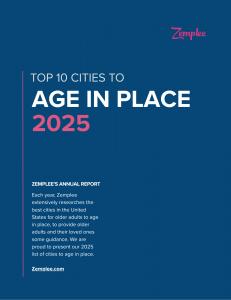New Report Reveals Top U.S. Cities Where Technology and Care Converge for Aging Americans
AI is becoming a bigger part of senior care. Does your city have the tech infrastructure to support the digital tools seniors need? Here are our rankings.
SANTA CLARA, CA, UNITED STATES, November 5, 2025 /EINPresswire.com/ -- As nearly 93% of older Americans express their desire to age in place, a new report identifies ten cities that emerge as great places to retire, leading the nation in combining essential healthcare access with the digital infrastructure that increasingly defines quality of life for older adults.
The Top 10 U.S. Cities to Age in Place 2025 Report, released by Zemplee, evaluated 168 American cities across four key factors: Quality of Life, Smart Aging Infrastructure, Health and Care Access, and Retirement Costs. For the first time, the analysis prominently features digital connectivity as a critical component of healthy aging.
“Internet access is more than just a convenience—it’s a fundamental necessity for older adults,” said Aparna Pujar, CEO at Zemplee, a Silicon Valley-based startup that offers AI-based remote monitoring for older adults. "Our research shows that cities with robust broadband infrastructure and telehealth adoption aren't just nice places to retire—they're enabling longer, healthier, more connected lives,” Pujar said.
2025's Top U.S. Cities for Aging in Place
This year's top ten cities span all four U.S. time zones and represent diverse climates, from sun-soaked Honolulu, Hawaii, and The Villages, Florida, to winter-weather destinations like Rochester, Minnesota (home to Mayo Clinic) and Flint, Michigan.
Each city exceeded national averages in environmental quality and demonstrated strong performance across healthcare access, affordability, and—critically—digital infrastructure that supports connected care.
The analysis evaluated metrics including telehealth adoption rates, broadband availability, geriatric physician density, home health aide availability, Medicare costs, and regional price parity. All selected cities have above-average populations of adults 65+ and demonstrate a commitment to an age-friendly infrastructure.
The cities:
Pittsburgh, PA
Rochester, MN
Honolulu, HI
Asheville, NC
The Villages, FL
Myrtle Beach, SC
Flint, MI
Sarasota, FL
Portland, OR
Fort Collins, CO
The Digital Divide in Care for Older Adults
The report's emphasis on smart aging infrastructure reflects a dramatic shift in how Americans access healthcare and maintain independence. Nearly one in four Medicare beneficiaries used telehealth services in 2022, according to KFF research, yet those without reliable internet were significantly less likely to access these services—creating a troubling equity gap.
The COVID-19 pandemic accelerated telemedicine adoption, with the FCC reporting unprecedented growth in remote consultations for managing chronic conditions, refilling prescriptions, and accessing specialist care. For older adults in rural or underserved areas, high-speed internet has become as essential as proximity to a hospital.
Beyond healthcare, internet connectivity serves as a powerful antidote to isolation—a condition affecting 28% of Americans over 65 who live alone. AARP research links internet and social media use to greater emotional well-being among older adults.
Smart Technology Enables Independence
The report recognizes cities investing in technologies that help older adults remain in their homes longer. Connected devices—from smart speakers and medication reminders to fall detection sensors and emergency response systems—provide peace of mind for families while preserving autonomy for people 65 and older.
"AI and IoT technologies are revolutionizing elder care," added Pujar. "Smart home tools enable remote health monitoring, improve safety, and give older adults and their loved ones more confidence and peace of mind. These tools can help families manage care costs and still make sure help is available with the sound of your voice or the touch of a button.”
Digital access also supports financial security, community engagement, and lifelong learning. Maintaining financial independence increasingly requires online banking capabilities, secure benefit portals, and fraud protection—services that demand both internet access and smart technology.
About Zemplee
Zemplee provides AI-powered remote monitoring solutions for older adults aging in place and those in assisted living or care facilities. The company is committed to advancing digital equity and connected care technologies that enable healthier, more independent aging. Zemplee is a participant in AgeTech CollaborativeTM from AARP.
For the complete Top 10 U.S. Cities to Age in Place Report 2025 and detailed city profiles, visit Zemplee.com.
Shaun Chavis
Zemplee
shaun@zemplee.com
Visit us on social media:
LinkedIn
Legal Disclaimer:
EIN Presswire provides this news content "as is" without warranty of any kind. We do not accept any responsibility or liability for the accuracy, content, images, videos, licenses, completeness, legality, or reliability of the information contained in this article. If you have any complaints or copyright issues related to this article, kindly contact the author above.

